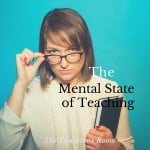For more years than I like to think about teachers in the United States have become the issue in determining why U.S. students do not perform as well as their international counterparts. The reason that there has been little success in turning our public schools around is that teachers are not the problem and until we focus on the REAL problem with our educational system we will continue to lag behind other countries.
The Organization for Economic Co-operation and Development (OECD), an international group of countries working to promote policies that will improve the lives of people around the world, has periodically sent out the Teaching and Learning International Survey (TALIS) to teachers in member countries. The survey seeks to find out how teachers feel about their jobs. The most recent survey was done in 2013 and the results are now available.
Here are some of the findings:
• 64% of middle school and junior high teachers feel that American teachers are not valued by society.
• Only 67% of American teachers had a permanent contract. (The average internationally is 83%)
• 64% of American teachers work in schools where more than 30% of their students come from economically disadvantaged homes. (This is the highest rate in 34 TALIS countries. The global average is 19.6%)
• In the U.S. teachers have longer working hours (45 per week) and more instructional hours (27 per week). This is 20% more working hours and 40% more time instructional hours than their international counterparts.
• American teachers have fewer Professional Learning Opportunities than their global counterparts. They do not team teach, plan activities with other teachers across grade levels and rarely have the time to observe other teachers and discuss techniques.
• No other country surveyed tests students using external standardized tests at every grade level. Nor are their teachers evaluated with value added scores from any testing that is done.
• Globally teachers receive more feedback from their peers than do American teachers.
As you can see U.S. teachers spend more time at their job compared to teachers in other countries. More importantly OECD found several important differences that affect student outcomes.
OECD found the following in higher performing countries:
• Countries that value teachers, pay them more relative to other college educated workers.
• Students achieve at higher levels in countries where teachers are valued.
• There is a focus on creating a culture of collaboration in their schools resulting in innovative practices.
• Higher performing countries find it easier to recruit and retain teachers.
There is one more factor that teachers in the U.S. must deal with that is not as much of a problem in other industrialized countries. That factor is how we finance our public schools. In the U.S. public schools are financed by federal, state and local taxes. As far back as 2002 a research article from ASCD (Association for Supervision and Curriculum Development), reported that about 50% of school funding comes from local property taxes. The issue here is that schools where property values are high receive more funding. Where they are low and many people are living in poverty, funding is scarce. Yet we are attempting to test students using standardized tests that do not take into account whether students have the books and equipment necessary to pass these tests. To add insult to injury we then take the standardized test scores and use these scores via the new “value added” concept to determine whether or not a teacher has been effective. Ironically, this can cause massive discrepancies in how teachers within the same state are evaluated. For example, New Jersey has areas with very high property values, mostly in suburban areas but at the same time has cities like Camden, Trenton, and Atlantic City where property values are low. Using a state teacher evaluation with added value scores, teachers in affluent areas who had all of the materials they needed to teach would be evaluated in the same manner as those in poor cities within the state who lack many resources.
We are already seeing a mass exodus of teachers from the profession. If we add to that the fact that colleges of education are getting fewer and fewer applicants we should be concerned that we are headed towards a serious shortage of teachers in the not too distant future. Considering these two facts, if we truly want a world class educational system for all of our students we must stop placing the blame for poor performance solely on the backs of our teachers. In addition, we must give them the tools that they need to actually teach our children instead of preparing them for a test written by those who do not work in or know how our schools. Lastly, we must show our teachers the respect they deserve so that they will remain in the profession and inspire young people to seek teaching as a career path.






Leave a comment